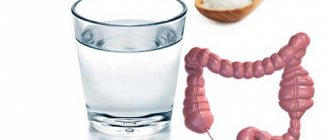A laxative at home helps to quickly empty the intestines and relieve discomfort. Homemade preparations can be prepared with your own hands from the simplest natural ingredients, such as herbs, vegetables, oils, soda.
Homemade laxatives sometimes work no worse than pharmaceutical drugs. Which method of therapy to choose is decided based on what the prescription is used for - treating short-term or chronic constipation.
Laxative recipes for children
Laxatives for children should have a mild effect so as not to spoil the children's intestinal microflora. A folk laxative for children is safer than laxative medications, which can cause complications and allergies.
Flax seed decoction
Infants can be given a microenema with a decoction of flaxseeds. This is a fast-acting folk laxative. It is necessary to carefully administer the enema without injuring the child. A decoction or tea of flax seeds can be given to children from three years of age.
Required:
- 3 grams of flaxseeds;
- 100 ml. boiling water
Cooking method:
- Pour boiling water over the seeds.
- Leave, stirring, for 15 minutes.
- Strain through cheesecloth or a sieve.
- We give the child 2 ml of decoction with unsweetened compote or water.
Dill water
Has a mild laxative effect. Prevents constipation, reduces colic.
Required:
- 15 grams of fragrant dill seeds;
- 300 ml. boiling water
Cooking method:
- Pour boiling water over the seeds.
- Leave for 20 minutes.
- Strain through cheesecloth.
- Give your child 20 ml throughout the day. dill water.
Prune compote
Natural laxative. Recommended for children from 6 months. For children over 3 years of age, this folk laxative can be consumed in its pure form, but not more than 5 prunes per day.
Required:
- 250 grams of prunes (you can add 50 grams of dried apricots, raisins, dried apples);
- 1 liter of boiling water;
- 60 grams of sugar.
Cooking method:
- Pour boiling water over the washed prunes.
- Infuse the berries for 3-5 minutes.
- Add sugar and stir.
- After boiling, cook for another 15 minutes (the berries should soften). Stir occasionally.
- Pass the cooled compote through cheesecloth and give it to the child. For a 6-month-old child, it is recommended to give no more than 250 ml. juice or compote per day.
Traditional methods
Senna leaves
Decoction and infusion of senna is used as an effective laxative.
The laxative effect of senna leaves is known to many people. They are used as a delicate traditional medicine to cleanse the intestines. Senna is rich in substances that cause irritation of the intestinal walls and subsequently a laxative effect. The leaves of the plant significantly reduce appetite, so they are used by people who are overweight. Senna is available in tablet form and as a crushed herb for making infusions. Brew the herb like ordinary tea and drink 200 ml 3-4 times a day before meals.
You can prepare a laxative mixture from the following herbs: senna leaves, dill seeds, chamomile and valerian root. Mix all ingredients and take 1 tbsp. l. the resulting collection, pour 250 ml of boiling water, leave overnight. Drink half a glass of this remedy before bed. Cleansing hay will help normalize intestinal functions and cope with constipation.
Flax seeds
An infusion of flax seeds is widely known for its beneficial properties. At home it is prepared like this: take 1 tsp. flaxseeds, pour 250 ml of boiling water, leave for 4-5 hours. There is no need to strain the infusion; take it with the seeds before bed. Flax seeds can also be added to any dishes - soups, side dishes, pies. Their regular use will normalize the functioning of the digestive organs, prevent constipation, and remove all harmful decay products from the body.
Intestinal massage
It is recommended to do a massage for constipation yourself at home. To obtain a positive effect, massage is performed in the morning, immediately after waking up, on an empty stomach. The massage procedure is as follows: wet a towel, squeeze out excess water, wrap it around your hand and move it along the right side of the abdomen without pressing too hard. Massage the right side from top to bottom and vice versa (10-15 times). Move to the left side of your stomach and do the same. After self-massage, you need to walk around the room; soon the urge to defecate will appear. This folk method will relieve constipation and intestinal pain.
Castor oil
A laxative effect occurs from taking castor oil.
Taking castor oil is considered a good method of intestinal cleansing. Carry out the cleansing procedure immediately before bedtime. You should drink the oil warm at the rate of 1 g per 1 kg of net weight. Wash down the oil with pure lemon juice (100 ml). If you feel nausea and vomiting, doctors advise eating 1 tsp. raisins The laxative effect will occur a couple of hours after the start of the procedure.
Water and other methods
A glass of warm boiled water on an empty stomach will help restore the body's water balance, which will improve the functioning of the intestines and other abdominal organs. To obtain the same effect, it is recommended to use melt water (frozen in the freezer). Mineral water with the addition of 1 tbsp. l. xylitol will help quickly empty the intestines and restore beneficial microflora.
Other ways to cleanse your colon at home include:
- Olive or vegetable oil, drunk on an empty stomach in the amount of 1 tbsp. l., will help cleanse the body and restore the functioning of internal organs.
- Beets are a mild laxative for cleansing the intestines and a source of vitamins necessary for the body. To prepare a cleanser, you need to squeeze the juice out of the vegetable, dilute it with water 1:2 and drink throughout the day, adding a pinch of salt. Beetroot juice reduces appetite and is a good laxative. It is used by people who want to lose weight and cleanse clogged intestines of toxins.
Diet for constipation
An important part of treating constipation is a properly formulated diet. The daily menu must include products that have a mild laxative effect without harm to the gastrointestinal tract.
- dishes made from raw, boiled or baked pumpkin;
- beet and carrot salads and fresh juice;
- white cabbage and its juice;
- kefir, cottage cheese, fermented baked milk;
- prunes - up to 15-20 pcs per day;
- bran and oats;
- flax seeds;
- plums, apples, avocados, melons and watermelons;
- green pea;
- spinach and other fresh greens;
- seaweed;
- black currant berries.
It is very useful to make natural juice from sauerkraut and drink 2-3 cups of it throughout the day. Cucumber pickle has a similar laxative effect.
A beet salad with olive oil will be a good addition to the daily menu.
It is imperative to exclude all foods with a binding effect from the diet. These include rich pastries, boiled eggs, fatty, rich broths, rice, semolina, and milk. You should also strictly limit canned food, smoked meats, marinades, hot spices and sauces, carbonated and alcoholic drinks.
What helps with constipation at home?
A simple laxative at home affects the body no less effectively than pharmaceutical drugs, but you don’t need to get carried away with it so as not to provoke atony. If a person cannot empty his bowels on his own for more than 3 days, urgent measures must be taken. All laxatives have a softening and irritating effect; they must be selected taking into account contraindications.
Freshly squeezed juice is known to help relieve constipation:
- apples;
- grapes;
- pumpkins;
- beets;
- tomato;
- pears;
- drain
Products for constipation
It is healthier for the body to take a natural laxative; not only products, but also mineral water are suitable. It needs to be warmed to body temperature, drink 1 glass three times a day. Plain water combined with exercise will also help:
- You need to drink 2 glasses of hot water in small sips.
- Then rotate your pelvis to the right and left 10 times, bend forward several times in different directions.
https://youtube.com/watch?v=oPw4NOOQeW8%250D
To prevent constipation from becoming chronic, doctors advise including laxative foods in the diet - vegetables, fruits, grains. They will also help if the problem of bowel movement worsens. You can use the following products:
- Bran.
They cleanse the intestines thanks to fiber; you should first take 1 teaspoon three times a day, gradually increasing the dose to 1 tbsp over 2 weeks. spoons. A portion of bran is brewed with boiling water for half an hour, the water is drained, and the steamed mixture is consumed. - Pumpkin.
Consume 50-100 g per day; you can grate it raw or bake it in pieces. - Prunes.
Eat 3-4 berries a day; both raw and boiled dried fruits remain effective.
Herbs for constipation
A reliable laxative at home is herbs; there are special mixtures that remove flatulence, cramps, and eliminate constipation. It is recommended to make infusions, they retain more beneficial substances
But it is important to consider that they give an effect only 3-5 hours after consumption
Senna requires special care; it should not be taken for more than 10 days, otherwise the intestines will forget how to work independently
When choosing herbal laxatives for constipation, it is important to know that some of them are addictive, so you need to take breaks. In this list:
- oregano;
- buckthorn;
- senna;
- thyme;
- Adonis;
- rhubarb;
- zhoster;
- clover.
There is also a safe herbal laxative prepared at home; such herbs can be drunk regularly for prevention:
- celandine;
- St. John's wort;
- linen;
- series.
Oils for constipation
Another well-known folk laxative is vegetable oil. In order for fats to retain their valuable properties, the product must be stored in a dark glass bottle. The most effective is castor oil, but sea buckthorn, flaxseed, and olive oil also help. These products soften stool and help it pass painlessly. An old recipe is a spoonful of oil for constipation on an empty stomach; increasing the dose is not recommended.
How to properly treat with oils:
- Linen.
Contains vitamins and polyunsaturated fatty acids, making the stomach walls stronger. You need to drink in the morning, half an hour before meals, 1 tbsp. spoon. - Olive.
Rich not only in fats and vitamins, but also in antioxidants that cope with infection. Take 1 tbsp. spoon for 30 minutes. Before breakfast, wash it down with warm water and lemon. - Castor.
Prescribed for intestinal motility disorders, it is based on castor beans, which contain acids to cleanse the walls of the mucous membrane. Take no more than 30 g per day. - Sea buckthorn oil.
Recommended for long-term constipation, when there is a risk of inflammation. Heals damage to the walls due to the passage of hard feces. Take 1 teaspoon in the morning as a medicine.
For pregnant
Laxatives at home, allowed during pregnancy, are an effective way to combat constipation and flatulence, which often bother a woman while carrying a baby. Glycerin suppositories and lactulose-based products are allowed. Enemas can be done only if there is no threat of miscarriage. Saline solutions when washing the intestines are contraindicated because they can provoke uterine hypertonicity. Herbal infusions may cause side effects, so their use should be discussed with your doctor.
Without medical advice, you can take honey water with lemon (on an empty stomach), as well as drink one of the vegetable oils (in the morning, 1 tsp). Recommended remedies are dried fruits - prunes, raisins, dried apricots. You can make compotes from them or take them raw (crushed) with the addition of honey, 2 teaspoons daily before bed.
Folk remedies
The effectiveness of alternative treatment is distinguished by its gentle effect on the body and at the same time numerous beneficial properties.
The most popular cleansing products:
- Honey. The drink is prepared from 1 tsp. per glass of boiled water. The honey solution is drunk on an empty stomach in the morning.
- Dill seeds. Brew 1 tbsp in 300 ml of water. l. plants. The decoction is infused for 60 minutes. The finished product is divided into 3-4 doses and taken before meals.
- Ginger. To prepare the drink, take 1 tsp. juice and a glass of water. Drink ginger solution 2-3 times daily.
- Aloe. Juice is squeezed out of 1 leaf of the plant, which requires cooling (in the refrigerator for 2 hours). Take the product throughout the day.
- Sagebrush. 1 tsp. herbs pour 1 liter of boiling water. Leave for an hour, strain. The drink is consumed 2 times a day.
Recipes:
1. Flour and sour cream.
The mixture normalizes fat metabolism, fights parasites, viruses, bacteria, removes toxic elements, and improves intestinal function. To prepare the product you will need 1 tsp. flaxseed flour (you can grind the seeds), 100 g of fermented milk product. Take dosage every day.
2. Lemon and castor oil.
For 1 kg of human weight, take 1 ml of castor oil and 2 times more citrus juice. The drink is mixed and drunk immediately. The product cleanses the body of parasites and feces. Colon cleansing at home involves taking folk remedies in the morning or before meals.
Brief summary
Constipation is a common and sensitive problem that can be faced by people of any age and gender. It can be solved at home using effective and fast-acting medications in the form of tablets, capsules, rectal suppositories, microenemas or powders for preparing a suspension.
Safe and gentle folk recipes will be a good auxiliary method of getting rid of constipation. They are well tolerated by the body, so most often it is alternative medicine that is used to treat stool disorders in children and women during pregnancy.
Types of laxatives
Based on the principle of action, laxative medications are divided into the following groups.
Medications for mitigation
They are used to cleanse the small intestine and are capable of dissolving fecal matter. The composition contains vaseline and almond oils, liquid paraffin and other substances. Prescribed for the purpose of prevention for persistent constipation, patients who have survived surgery, heart failure, women in the postpartum period, hemorrhoids, microtrauma of the anus.
Drugs that increase colon contents
Penetrating into the human body, the active components increase in volume and promote emptying. The medicines are based on fiber and pectin, which successfully bind toxins and waste products used for intoxication and constipation. These same substances are found in some fruits, vegetables, bran, and flax.
Contact laxatives
The substances included in the composition activate rectal peristalsis due to the interaction of the active substances with the mucous membranes of intestinal cells. These medicines contain castor oil, rhubarb, buckthorn, sodium picosulfate, phenolphthalein.
Enemas
Colon cleansers used as microenemas have the ability to dissolve in the blood, bypassing the stomach, and are often prescribed by doctors. Most often, the volume of such enemas is no more than 100 ml.
Osmotic medications
They increase the osmotic pressure in the intestinal system, stopping the dissolution of the liquid, which is why the fecal matter swells. Karlovy Vary salt, lactulose, sodium sulfate, having a mild effect, are not addictive, help cleanse all parts of the system, starting the natural process of emptying.
Other
Prucalopride and tegaserod are used for irritable bowel disease, as well as when other cleansing methods are ineffective.
Self-prescription of medications is unacceptable: only a doctor will help you figure out which remedy is best for a particular patient.
Making laxatives at home
There are many recipes for laxatives that can be made at home. There is nothing difficult about it. The only difficulty is the correct laxative recipe. The most famous and common recipes are the following:
- Vegetable juice made by mixing spinach and beet juices. The proportions are one to one. The resulting mixture must be diluted with water to create an acceptable consistency.
- A decoction of medicinal herbs. If you experience occasional constipation, then you should resort to this recipe. You should make a decoction of the following ingredients: a mixture of chamomile, marshmallow root, fennel fruit, licorice. The components are taken in equal quantities. The mixture is brewed with boiling water and consumed at night.
- If constipation is regular, then you should use a stronger decoction, which can be prepared from calamus, tansy, valerian root and St. John's wort. The decoction is consumed before meals.
- Aloe juice treats chronic constipation. This juice should be drunk in a small spoon for two or four weeks. Consumed before meals.
- Also useful for constipation is a product such as fresh cabbage juice, which is diluted with water. Used twice a day. In principle, cabbage juice can be replaced with cucumber brine, sauerkraut brine, and juice from raw potatoes.
- Oddly enough, a product that can act as a laxative is honey. To take advantage of its laxative properties, dissolve a small spoon of honey in a mug of warm water and then drink it.
Exercise to relax your bowels
Depending on the type of constipation (spastic or atonic), home therapeutic exercises that help relax the intestines are divided into two types. For spastic constipation, exercises are aimed at relieving spasm, so abdominal exercises are excluded, and classes are carried out at a slow pace. The atonic type of peristalsis disorder requires intense movements with a large number of repetitions. An example of a simple complex is the following list of exercises (performed while lying on your back):
- Raising straight legs to an angle of 90°. The upper position is held for 15-20 seconds, the number of repetitions is 10-15 (for spasm), 4-6 (for atony).
- The legs lying on the floor are spread apart from each other by 20-30 cm. One by one, each leg is raised 30-45° from the floor and lowered back. Repeat 7-10 times.
- The legs are raised above the floor by 45° and imitate riding a bicycle. Duration of execution – 40-90 seconds.
- The legs are bent at the knees and pulled towards the stomach, held in this position for 7-10 seconds and lowered back. First, the exercise is done with both legs at the same time, then with each leg separately (number of repetitions - 10-15).
- Straight legs are raised up and behind the head, then lowered back. Number of repetitions – 5-15.
It's time to cleanse your intestines
First, let's find out why pollution occurs. It depends primarily on nutrition. Snacks on the run, foods with strange additives, and a small dose of fiber cause us great harm. Junk food, once in the stomach, is poorly digested, but rots well, poisoning the body.
How do you know if your colon needs a cleanse? There are several signs by which one can judge the degree of contamination of the body.
- Deterioration in health.
- Decline in performance.
- Frequent colds due to decreased immunity.
- Frequent bloating, flatulence, diarrhea alternating with constipation.
- Rashes on the face.
- The skin loses its natural color, acquiring a gray tint.
- Excess weight.
- Thick coating on the tongue.
- Unpleasant body odor even with careful hygiene.
In order not to harm the body, you should consult a doctor and then start cleaning. This procedure cannot be carried out if you have diseases such as:
- Tumors in the pelvic organs.
- Exacerbation of hemorrhoids.
- Exacerbation of gastrointestinal diseases.
- Diverticulitis, Crohn's disease and others.
With caution in case of hypertension, diabetes mellitus, heart disease
Bran for colon cleansing
Cleansing the intestines with bran is a method that has also proven itself on the positive side. It has long been used by representatives of traditional medicine. To cleanse with bran, you need to eat it before eating in the amount of 2 tablespoons, that is, during the day - 6 tbsp. l bran. This amount will be enough.
Due to the fact that bran is a grain shell, it is rich in fiber and therefore cannot be digested by the human body. Getting into the stomach, and subsequently into the intestines, they absorb and remove from the intestines all the decay products that have accumulated there. And given that they can increase the movement of bile, it is recommended to take them before cleansing the liver.
When taking bran, you must remember that water consumption must be mandatory and such purification should be carried out throughout the month.
Laxative powders for preparing a solution
Powders for preparing a solution are used in rare cases, as express means for quickly cleansing the intestines before surgery or diagnostic procedures.
Fortrans - a sachet of medicine is intended to be dissolved in 1 liter of cool boiled water. It is recommended to drink the prepared solution 100 ml every hour. Fortrans not only cleanses the intestines of fecal accumulations, but also removes waste and toxins from the body.
Macrogol is a laxative based on salt minerals. Facilitates the removal of feces due to their rapid softening. It is not recommended to use for a long time.
Magnesium sultate - This drug, also called magnesia, is used to prepare an oral suspension. The effect of the medicine begins within 15-25 minutes after use.
The maximum permissible dosage of magnesium sulfate is 150-200 ml.
Magnesia is intended for single use only. Magnesia contains salt minerals that irritate mucous tissues and intestinal walls, accumulate fluid from the body and direct it into the cavity of the digestive system. It has a negative effect on the intestines; after treatment, it is recommended to take a course of probiotics to restore the microflora.
Negative consequences
Stimulation of the intestinal system can lead to poor absorption of nutrients entering the body with food. Some types of laxatives have a negative effect on the heart and blood vessels, and in women, on the uterus.
The systematic use of special means for emptying can provoke addiction.
If cleansing procedures are abused, diarrhea may occur. In addition, patients may experience pain in the abdominal area, water-salt imbalance, and lack of organ peristalsis. Sometimes the drugs provoke a change in the color of urine, deterioration of the digestion process, skin rashes, and tachycardia.
Herbs with laxative effects
Contains dietary fiber and biologically active components. Anthraglycosides and essential oils reduce inflammation of the gastrointestinal mucosa, dilute stool and remove it, cleansing the intestines and eliminating spasms.
Buckthorn bark
Contains inactive anthraglycosides (8%). Therefore, the laxative effect occurs 8 hours after taking the decoction. Not suitable for frequent use as it is addictive.
- Pour 20 grams of bark into 250 ml. boiling water
- Let the broth brew for 25 minutes and cool.
- Drink 125 ml before bed. decoction
Zhoster
In terms of laxative effect and glycoside content, it does not differ from buckthorn bark. It has an antibacterial effect, as it contains 3% ascorbic acid.
- Pour a tablespoon of fruit into a liter jar.
- Pour in 250 ml. boiling water
- Leave the broth for two hours, then pass through cheesecloth.
One tablespoon of joster decoction will help relieve constipation. Use 3 times a day.
Rhubarb root
Contains tanoglycosides (8.7%) and anthraglycosides (4.5%). The former have astringent properties and help against diarrhea. The latter, on the contrary, are responsible for “awakening” the intestines and help cope with constipation. To combat constipation, brew rhubarb root.
- Pour two tablespoons of chopped root into 500 ml. boiling water
- Leave for an hour.
- Drink 250 ml. decoction twice a day.
Has no contraindications for pregnant women.
Toadflax
Contains active glycosides, so the laxative effect occurs within the first two hours after use. “Atlas of Medicinal Plants of the USSR” Tsitsin confirms that the herb helps cope with acute constipation. Has a strong choleretic effect. Use is contraindicated for pregnant women. For diseases of the liver, kidneys and gall bladder, use as recommended by a doctor.
- Pour a teaspoon of flax seed into a glass of boiling water. Leave for 12 hours in a thermos mug.
- Drink the entire infusion before bed along with the seeds.
Cannot be used for long-term use.
Laxative herbs, laxative herbal mixtures and preparations containing laxative herbs are recommended to be used after consultation with a doctor.
Collection of laxative herbs:
- Licorice root (powder). Stir one teaspoon of powder in warm boiled water and drink.
- A collection of buckthorn bark, licorice, fennel and anise. Prepare a decoction. Drink 60 ml. decoction twice a day.
- A collection of licorice, buckthorn bark, joster and fennel. Prepare a decoction and drink 250 ml. in a day.
- A collection of peppermint, chamomile, buckthorn bark, anise and fennel. Prepare a decoction. Drink 125 ml. decoction twice a day.
The benefits and harms of colon cleansing
There are two conditional groups of cleansing procedures:
- Oral – this group includes the use of laxative medications, adsorbents, freshly squeezed juices and a special diet.
- Through the anus - a colon hydrotherapy procedure in a clinic, or using an Esmarch mug at home.
Carrying out any type of cleansing procedure brings healing to the body, but there are also some side effects.
| The benefits of cleansing procedures | Harm from the use of cleansing procedures |
| 1. Effective in the treatment of chronic constipation and intestinal blockages. 2. Freeing the intestines from harmful substances, rotting products, and parasites. 3. Peristalsis, absorption of nutrients and vitamins contained in food improves. | 1. With prolonged use of cleansing enemas or laxatives, dependence on the procedures occurs, intestinal motility weakens, and natural bowel movements become extremely difficult. 2. Frequent use of enemas disrupts the ratio of beneficial and harmful bacteria in the intestines, which leads to the occurrence of various diseases. The period of restoration of intestinal microflora may take several months. 3. Carrying out the hydrocolonoscopy procedure by unqualified medical personnel can lead to serious intestinal injuries, including through perforation and serious complications. |
Enema
The most effective and fastest-acting procedure for constipation is an enema. You can do it yourself at home. Standard intestinal lavage is carried out according to the following algorithm:
- Esmarch's mug is purchased at the pharmacy.
- A solution for washing is prepared, the usual volume is 2 liters. Boiled water can be mixed with a laxative herbal decoction or oil extract. The temperature of the enema solution should not exceed 25-30°C.
- The anus is lubricated with Vaseline, the patient takes a knee-elbow position and inserts the tube into the rectum.
- A special tap is turned on the mug, and the intestines are slowly filled with liquid.
- After the entire volume of the solution has passed from the mug into the body, you need to lie still for several minutes and then empty your intestines.
Carrying out enemas quickly solves the problem of difficult bowel movements at home than a laxative intended for oral administration. The procedure helps cleanse the intestinal mucous membranes, simultaneously removing loose feces. Two types of washing are used:
- Hypertensive. A saline solution in a volume of 1 liter is injected into the intestines. The high concentration ensures the collection of fluid in the intestinal lumen. This enema helps soften hard stool and facilitate its removal from the body.
- Siphon. A large volume of liquid is used (from 5 to 7 liters), preference is given to decoctions of chamomile, sage, and St. John's wort. The procedure has laxative and anti-inflammatory effects.
Rules of application
But there are still some general recommendations for using laxatives to cleanse the body:
- Before taking any laxative (this applies to both medications and folk remedies), you should first consult your doctor.
- Read about contraindications and side effects.
- The day before cleansing the intestines, adhere to the following diet: give preference to fresh fruits and vegetables, exclude heavy foods: meat, baked goods, animal fats, sweets, and also drink at least 2 liters of water per day.
- The day before, it is advisable to take a good steam in the bathhouse and sit longer in a hot bath.
- On the day of cleansing, it will be more comfortable to be at home.
- Do not load the stomach.
- It is not advisable to drink alcohol or smoke for 24 hours before and after the procedure.
- Clean no more than once a week.
- If nausea occurs, it is recommended to eat a couple of raisins.
- If the procedure causes very unpleasant sensations, pain syndromes, discomfort, other laxative drugs are selected - preferably lighter and gentler ones.
- On such days, refuse toilet paper, which will irritate the anus with repeated use. After each bowel movement, it is better to wash yourself with warm water.
Application of microenemas
- Cut off the seal at the end of the tube.
- Press on it so that the tip is lightly lubricated with the solution - this will facilitate the insertion process.
- Insert the tip into the anus to its full length.
- Completely squeeze out the contents of the tube.
- Remove the enema while continuing to press on the tube - this will eliminate pain at this stage.
After cleansing
- Adjust your sleep schedule.
- Avoid coffee and carbonated drinks.
- Workout.
- Drink more pure water and natural juices.
- Your daily diet should include nuts and greens.
- Avoid stress.
- Adhere to the principles of proper nutrition.
- Regularly arrange fasting days or cleansing procedures using laxatives.
Laxative recipes for adults
Physical activity, proper nutrition and prevention of “malfunctions” in the intestines are means to combat constipation. But if the problem strikes you suddenly, use folk laxatives.
Salad "Broom"
Cleanses the intestines, “sweeping out” toxins and harmful substances. The salad is prepared without salt and spices. The salad dressing is lemon juice.
Required:
- 1 medium-sized beetroot;
- 2 small carrots;
- 0.5 fork medium sized cabbage;
- 1 green apple;
- 3 tbsp. spoons of lemon juice;
- dill or parsley to taste.
Cooking method:
- Grate raw vegetables on a coarse grater. Shred the cabbage. Cut the apple into small cubes.
- Stir and season the salad with lemon juice.
- Add finely chopped dill or parsley to taste.
Dry peas
By “stimulating” the colon, it improves bowel function.
You will need 200 grams of dried peas.
Cooking method:
- Grind the peas into powder.
- Take 1 teaspoon per day for 5-7 days.
Brine
A folk laxative, stimulating the walls of the colon, activates intestinal function. The main thing is that the brine is in its pure form without additives or seasonings.
You will need 1 liter of pure cucumber brine.
Mode of application:
- Drink a glass of brine (250 ml.) 4 times a day.
- You can drink the brine while eating fresh or lightly salted cucumber.
Dried fruits
Prepare dried fruit puree. This homemade laxative is a dessert that your stomach will love.
Required:
- 500 grams of dried apricots;
- 500 grams of prunes;
- 200 grams of raisins;
- 200 grams of figs;
- 300 grams of dates;
- 5 tbsp. spoons of honey.
Cooking method:
- Soak all ingredients (except honey) in water. Pass through a meat grinder until smooth.
- Mix with honey.
- Store the resulting puree in the refrigerator. It can be spread on bread, added to porridge instead of butter, and eaten with cheesecakes and pancakes.
Castor oil
This is a fast-acting folk laxative. Recommended for use in emergency situations only.
You will need 1-3 tablespoons of castor oil.
Mode of application:
- Take orally after a meal or snack.
- Drink a glass of boiled water.
Kefir
A glass of kefir, drunk 2 hours before bedtime, normalizes intestinal function.
Mode of application:
Before going to bed, drink 1 glass of kefir. The drink can be slightly warmed.
Folk laxatives such as Panicle salad, peas and dried fruits are suitable for older people. They will help cope with constipation without disturbing the intestinal microflora.
Castor oil, kefir and brine are quick folk laxatives. Consumption in large quantities causes an imbalance in the intestines. Follow the instructions for use.
Remember that constipation is caused by poor diet and sedentary lifestyle. Take care of your health, do exercises and walk in the fresh air more often.
Laxatives at home
It should be remembered that the treatment of constipation must necessarily be comprehensive, which involves compliance with several regimes at once, including drinking regime, correct daily routine, as well as performing various physical exercises
In addition, pay special attention to creating a special diet that will subsequently help get rid of unwanted constipation.
It is also recommended to use various laxatives to help overcome constipation. The user can turn to various medications, but their use is not recommended. No matter how productive they are, the principle by which such drugs act is focused on intestinal irritation. In order to ensure a milder effect, you should turn to products that can be prepared at home.
There are a number of products that can cause a laxative effect, that is, they can be used to treat constipation. These products are:
- bran;
- prunes;
- flax seeds;
- pumpkin;
- plum;
- green hour with added milk;
- kefir;
- beet;
- peas and others.
As for bran, we can say the following: this product is really very effective in the fight against constipation. This is due to the high fiber content of bran. They also contain a lot of vitamin B. This vitamin helps improve the functioning of the large intestine. You can eat bran in the following form: add a large tablespoon to food, after brewing it with boiling water. The user can also buy bread containing bran in its composition.
Pumpkin dishes can also help relieve constipation if consumed regularly. Pumpkin is a product that can help with constipation and more. It is also recommended to consume pumpkin in cases where there are various pathologies affecting the intestinal organs.
Other foods can also help relieve the discomfort caused by constipation. Eating prunes and plums has a beneficial effect on intestinal function and improves digestion. They can be consumed either in their usual form or in the form of various compotes and decoctions. Eating oatmeal cookies regularly may also help. Flax seeds, prepared in a special way, can be a very effective laxative. To prepare a laxative from flax seeds, you just need to brew them in a proportion of 5 grams per 200 ml of boiling water, and then leave for 10 hours.
You should pay attention to products such as peas, beets and onions. Their use in almost any form is highly recommended.
These vegetables have the necessary laxative effect, and also contain vitamins that will be useful not only in case of constipation. A fairly strong laxative that can be made at home is kefir or another fermented milk product, provided that it is mixed with a small amount of vegetable oil. This will help you achieve results in a fairly short time. A similar remedy is green tea with milk, in which you need to add a pinch of salt instead of sugar.
Also, any person facing the problem of constipation must remember that regular consumption of water and vegetable juices can help in this situation. In order to ensure proper functioning of the digestive system, doctors recommend consuming the above-mentioned liquids in the amount of two liters per day. By the way, if a person suffers from constipation, he is recommended to avoid drinking fruit juices, soda, strong tea and coffee. They can negatively affect bowel function.
Advantages of contacting MEDSI
- Help from experienced doctors.
Pediatric coloproctologists, gastroenterologists and psychologists work with patients. They know exactly how to treat constipation in a child in accordance with the reasons that provoked it - Diagnostic capabilities.
The clinic can conduct complex examinations. They allow you to identify the causes of the pathology, find out how and what caused constipation in a child, and help him as soon as possible - An integrated approach to solving the problem.
Doctors not only recommend diet and exercise. If necessary, specialists prescribe laxatives, antispasmodics, as well as agents that stimulate the evacuation of feces (enemas and suppositories). All drugs are selected individually - Preventing complications.
To prevent the undesirable consequences of constipation, regular examinations by a coloproctologist are mandatory. - Comfort of visiting clinics.
We provide timely consultations without queues at a time convenient for patients
To make an appointment, just call 8 (495) 7-800-500. Our specialist will answer all questions and suggest the optimal time to visit the doctor. Recording is also possible through the SmartMed application.










